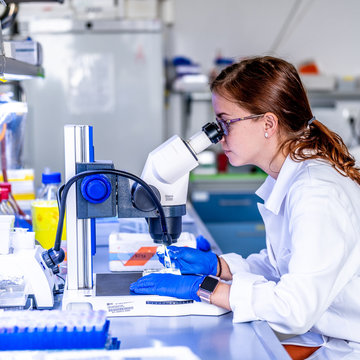
Scientists discover rare antibodies that block all SARS-CoV-2 variants
More than ten million sequences of the SARS-CoV-2 coronavirus had to be examined by an international team of scientists to find universal weaknesses of coronaviruses that do not change even with frequent mutations and the emergence of new variants. Analysis of patient samples then revealed rare antibodies that block all previously known SARS-CoV-2 variants, as well as other human coronaviruses, and are thus prepared for other possible future mutations. Scientists from the Biology Centre of the Czech Academy of Sciences, the Czech Centre for Phenogenomics of the Institute of Molecular Genetics of the CAS and the Faculty of Science of Masaryk University participated in the development of the antibodies. The discovery was published at the end of January in the journal Science Immunology.
As the COVID-19 pandemic continues, the SARS-CoV-2 virus is also evolving. Emerging variants may have new properties that make them evade our immune system better than their predecessors. This reduces the effectiveness of vaccination and protective antibodies, so we need to continue to develop new generations of vaccines and drugs. Swiss scientists at the Institute for Research in Biomedicine in Bellinzona, together with American and Czech collaborators, have approached this problem by focusing on finding the parts of the virus that do not change during evolution and that are also sensitive to antibodies. They found 15 such universal and highly conserved regions on the coronavirus where the virus does not mutate at all.
By analysing samples from patients with COVID-19, the researchers used a newly developed method to find very rare antibodies specific to all 15 of these conserved regions that can block the virus. "These sites are the same for all SARS-CoV-2 variants and all other coronaviruses. The virus cannot mutate there. When these newly-discovered antibodies bind to the spike protein of the coronavirus, it causes changes in its structure, and the virus cannot bind to the receptor on the host cell surface," explains Daniel Růžek from the Institute of Parasitology at the Biology Centre of CAS. In this study, Růžek's team successfully tested the antibodies in cell cultures and in special laboratory mice susceptible to SARS-CoV-2 infection. "In laboratory experiments, we confirmed that the antibodies block viral infection and protect against disease, even in the newest variants. The antibodies are now ready for a clinical trial," says another of the study's authors, Martin Palus from the Institute of Parasitology at the Biological Centre of the CAS.
Scientists from the Czech Centre for Phenogenomics of the Institute of Molecular Genetics of the CAS and the BIOCEV Centre also participated in the characterisation of the effect of the antibodies by creating special mice that model Covid-19 infection in the lungs.
The Czechs collaborated with Swiss scientists two years ago to develop a bispecific antibody against the coronavirus, which has already entered clinical testing. However, with the emergence of the omicron variant, it turned out that it does not work against this variant. Even with this disappointment, the team has refined its original concept and prepared a new generation of promising antibodies. "New coronaviruses are likely to emerge. Our results suggest that it is already possible to develop countermeasures that are broadly effective against current and future coronaviruses," said Davide Robbiani, lead author of the discovery and director of the Bellinzona Biomedical Research Institute.
Source: Biology Centre CAS
